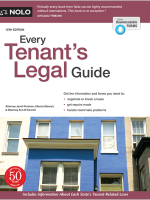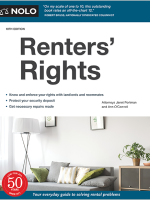Whether you’re a young professional just starting your career, or you live in a big city where living alone is a true luxury, you have probably thought about getting a roommate. Most shared living arrangements begin amicably, but disagreements are bound to come up. Having an agreement in place may help prevent any misunderstandings and protect you from a lawsuit. Let’s take a look at roommate agreements and how they work.
What Is a Roommate Agreement?
A roommate agreement is a written contract that outlines the agreed-upon terms for living together, and the rights and obligations for each person (‘tenant‘) living in a household.
The agreement may also be known as a housemate agreement, roommate contract, or housemate living agreement.
What Should a Roommate Agreement Include?
The agreement should address common situations that are likely to come up when living with someone. Top factors you’ll want to include are:
1. Parties
Your agreement should list the names of each person who will be living in the residence and the name of the landlord. You could also include the specific bedroom each tenant will use and the term of the ‘lease.’
2. Rent
Your agreement should detail how each tenant will pay their portion of the rent. Include information about whether each tenant will pay the landlord separately, or if one tenant pays and gets reimbursed by the other roommates. If one roommate is going to get reimbursed, the agreement should state the time frame for repayment. You’ll also want to note whether rent is divided evenly or based on bedroom size.
3. Expenses
Detail if all bills (utilities, cable, internet, etc.) will be in one person’s name or if each roommate will be assigned certain bills.
4. Moving Out
The agreement should detail what happens if one tenant moves out. You’ll want to know whether the person moving out will be responsible for finding a replacement tenant to cover rent and expenses, how much notice they need to provide, and how their security deposit is returned.
5. Chores
Different cleaning styles can be challenging when living with someone else. A cleaning chart can help avoid conflict. You may want to include a schedule stating who is responsible for cleaning the kitchen, common spaces, bathroom (if shared), and emptying the trash and recycling.
6. Guests
Setting the rules for guest visits will be a very important part of your agreement. Ideally, you’ll already have an idea of whether your roommate is a social butterfly or an introvert. One of the most respectful things you and your roommate can do for each other is state whether guests will be allowed, and if so, for how long, how often, and whether overnight visits are okay.
7. Food Sharing
Imagine coming home from a long day at work and wanting nothing more than to heat up your leftovers and fall into a food coma. Instead, when you open your refrigerator, your food is gone. Depending on how good those leftovers were, this scenario might just start a war. Keep the peace, and set up a rule for sharing food in your agreement.
8. Pets
Not everyone wants to live with an animal, so your agreement should state whether pets are allowed. If anyone has a pet or decides to get one, your agreement should lay out the cleaning responsibilities and extra expenses associated with the pet.
9. Smoking and Alcohol Use
One important item to add to your agreement is whether or not your residence will be smoke free and/or alcohol free.
10. How to Resolve Conflicts
You and your roommate are bound to have the occasional disagreement. To avoid major conflicts, your agreement should detail how disagreements will be handled. Will you and your roommate have an in-person meeting or will communication by phone call or text be allowed when one roommate isn’t at home?
What Happens When the Roommate Agreement Is Violated?
Unlike a lease agreement with your landlord, the entire roommate agreement may not be legally binding. Stipulations in your agreement, like not eating your roommate’s food or promising to keep your music down, will likely not merit taking your roommate to court.
However, the financial aspects of your contract could be heard by a judge. So, if your roommate does not pay rent or utilities, you could file a suit and take them to small claims court.
Sample Roommate Agreement
You can use this sample as a guideline and customize it based on your needs.
The following parties, [enter roommate names], herein referred to as roommates, are co-tenants at [enter address]. The roommates have signed a lease dated [enter date], expiring on [enter lease termination date] with landlord, [enter landlord’s name].
[Each name of roommate] all agree to the following:
1. Rent. The monthly rent is [enter amount]. The roommates agree to split the rent evenly and each pay [enter amount]. Roommate A [insert name] will write a check for the full amount each month, paid to [enter landlord’s name], and mail the check to landlord on or before the first of the month. Roommate B [insert name] will pay Roommate A [insert name] [insert amount] each month [enter number] days before rent is due.
2. Security Deposit. [Enter roommate names] will split the security deposit of [enter amount] and each pay [enter amount].
3. Utilities. Utilities will be under [Roommate A] name. [Roommate B] agrees to split utilities evenly and promptly reimburse [Roommate A].
4. Spaces.[Roommate A] will occupy the large bedroom; [Roommate B] will occupy the small bedroom. Each roommate will use the bathroom attached to their room.
5. Food. Each roommate is financially responsible for their own food and drink purchases.
6. Cleaning. Each roommate will be responsible for cleaning their own bedroom and bathroom. Roommates will use a chore chart for the purposes of dividing the household chores for the rest of the apartment including the living room, dining room, and kitchen. The chart will state whose turn it will be to vacuum, dust, and mop on a weekly basis.
Each roommate will promptly clean up after themselves in the kitchen. No one will leave dishes in the sink for more than 24 hours, and everyone will promptly clean up when asked.
7. Guests. Each occupant agrees to have no more than one overnight guest at a time and to inform the other residents in advance, if possible. Overnight guests may not stay more than three nights in a row. Each occupant agrees to no more than four overnight guests a month.
8. Moving Out Early. If a roommate wants to leave before the lease expires, they will give as much notice as possible (and not less than one calendar month) and diligently try to find a replacement tenant who is acceptable to the remaining roommate(s) and the landlord. The person leaving the residence agrees to continue paying rent and utilities until a replacement tenant is found.
9. Agreement is Complete and Binding. Roommates agree by their signatures to terms in this contract.
Printed Name of Roommate A
Signature of Roommate A
Date
Printed Name of Roommate B
Signature of Roommate B
Date
Ready for Household Harmony?
Having a clear understanding of responsibilities and guidelines is the first step to a peaceful living arrangement with your roommate. Drafting a roommate agreement is a great way to help you and your roommate feel comfortable in your residence. If you’re still not sure what to do next, you can get help drafting one with a free attorney evaluation.


